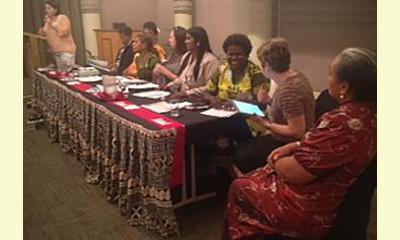|
|
Educators' network to empower women in the Pacific
an article by Education International
Over 40 representatives from 11 countries in the
Pacific gathered for two days in Fiji to outline
their unionsí plans to grow the womenís networks
and promote equality in education and unions in
the region. The womenís network meeting was held
prior to the triennial conference of the Council
of the Pacific Education (COPE, Education
International (EI) regional organisation in the
Pacific).

click on photo to enlarge
Tili Afamasaga, from the Samoa National Teachersí
Association and Chair of COPE, set the tone by
reminding younger colleagues that the COPE Womenís
Network had been instrumental in promoting equal
rights in the Pacific for the last 25 years. Other
regions copied the model of EIís Womenís Network
which is now successful throughout the world since
the launch of the Arab Womenís Network in 2012.
Despite their overrepresentation in the teaching
profession, women continue to experience
challenges in reaching decision-making positions
due to traditions, culture and inhibitions.
Progress is slow but steady. Most Pacific Islandsí
unions now have Equality Officers whom female
teachers can contact to express their needs and
challenges. Legislation is gradually guaranteeing
improved equality in society.
Participants expressed their concern about the
continued violence against women and girls and the
casualisation of the teaching profession. The
distance between the outer islands makes it
difficult for unions to reach out and recruit. "If
women knew about the training opportunities
offered by teacher unions and the benefits of
networks, many more would join the union," said
Oketi Tangitau from FITA Tonga.
Communication, organising and union governance
were key training areas delivered to the
participants. Fay Volatabu, Chair of the Fiji
Women Council, talked about the Convention on the
Elimination of All Forms of Discrimination against
Women (CEDAW) and encouraged teacher unions to
challenge Governments about their commitment to
this important instrument to promote equality.
The COPE network also resolved to set up a
Facebook account to maintain the communication
between formal meetings. All unions adopted a Plan
of Action consistent with the COPE Strategy to be
reported upon at the next COPE conference. The
network was supported by COPE and the Australian
Education Union (AEU).
|








|
DISCUSSION
Question(s) related to this article:
Gender equality in education, Is it advancing?
* * * * *
Latest reader comment:
Re: Gender equality in education: is it advancing
Considering that the first women to somehow get into universities was in the 19th C, we are making tortoise-like progress. Although there are more women than men in most schools now they tend toward the Arts where they are scorned by men in science. That's the kind of thing that was passed around 60 - 70 years ago but it's still here today. But, there is a trend that will make a difference quite soon: the majority of regional politicians are women who are Arts grads and they are going to shift the weight of policy to domestic from global. That will mean less war, more peace, more freedom and better education for women.

|
|









